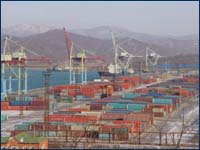THE HUB
FOR ASIA PACIFIC
 SHIPPING
AND LOGISTICS SHIPPING
AND LOGISTICS |
The transport sector plays a major role in Primorsky
Krai, with four major ports and the terminus of
the Trans-Siberian Railroad in Vladivostok that
stretches 9,000 kilometers across the largest country
in the world. The region's task now is to create
a modern infrastructure, enabling Russian businesses
to convey cargo speedily to the US and Asia. Developing
the transport sector is one of the priorities of
a federal program for the Economic and Social Development
of the Far East and Trans-Baikal, which covers the
period until 2010.

A key sector is logistics and shipping, with giants
such as the Far Eastern Shipping Primorsk
Shipping Corporation (PRISCO) Company (FESCO),
and competing for market share with newer players
such as Oceaninterbusiness which ships timber to
Japan and China and is the largest exporter of Siberian
Pine to Asia, S&T Group, Mivitrans Asia, which
runs a line to Vietnam, and Denmark's Maersk, which
recently opened an office in Vladivostok.
Nakhodka's Primorsk
Shipping Corporation (Prisco) owns 46 vessels
with deadweight of 820,000 metric tons. It is Russia's
only private tanker company that ships petroleum
products and crude oil from Russia, particularly
from Sakhalin. "We are now building 2 tankers
but in the very near future we are going to start
with 3-4 other tankers, all of them will be used
in relation with the Sakhalin Project. Says Mr
Alexander Kirilichev, General Director of Prisco.
The geographical positioning of the region coupled
with strong Asia-Pacific connections, for many logistic
companies is of paramount importance and is recognized
to be a changing and essential feature for future
market growth. "Of course we are investing
in the Asian market. The situation is changing.
The fleet used to be managed 100% from Nakhodka,
but now 80% come from Singapore. Probably will have
to manage our fleet from China." Adds
Kirilichev.
Competition is fierce and smaller private companies
are also present in the market such as OceanInterbusiness,
that specialize in exporting Russian timber produce
to Asian and external markets, particularly Siberian
pine and Larchwood to Japan. Another young, dynamic
and recently established company in the transportation
and logistics sector is the successful S&T Group,
that also works extensively throughout the Russian
Far East and Asian pacific markets and specializes
in all areas from shipping, logistics, export and
trading.
The Far Eastern Shipping Company dates back
to 1880 and is the largest shipping company in Eastern
Russia, owning a fleet of 74 vessels that transport
cargo to Asia, Australia and the USA. The company
is 19.8 percent state-owned. In May 2002 a group
of companies affiliated with the Russian parliamentary
deputy Mr. Sergei Generalov bought a controlling
block of shares in the company and initiated a management
shakeup, resulting in Yevgeny Ambrosov being elected
as general director in September 2002.
 PORTS PORTS |
Stretched along the Pacific coast, Primorsky Krai
has several major ports, and the chief city of Vladivostok,
built around a natural harbour, was planned as a
hub of foreign trade. Today the ice-free Golden
Horn Bay shelters Vladivostok Commercial Port, which
has an annual cargo turnover of 6 million tons.
To the south, Nakhodka Commercial Port processed
over 5 million tons of cargo in 2002, and is one
of the three biggest ports in the south of the Russian
Far East. |

Primorsky Krai is home to the largest deepwater
port on the Russian Pacific coast, Vostochny,
which had a turnover of 16 million tons of cargo
in 2002, and specializes in coal, timber, fertilizer
and container shipments. The port is expanding
its coal terminal and will soon open a terminal
for methanol, as well as planning to build additional
terminals to export LPG (Liquefied Petroleum Gas),
and chemicals.
The port's chief shareholders are Severstaltrans,
which bought a 17 percent share and then a 60
percent controlling stake through partner companies,
and the Ministry of Property Relations (20 percent).
"The national strategy is for Vostochny
port to act as a bridge to the Asian market.
All kinds of cargo transferred or planned for
transferring in Vostochny port will be in demand
in south eastern Asia within the next few decades,"
says Vladimir Popov,
General Director of the port.
"We process coke for India, we are partners
and coal exporters with Australia and we are learning
from their experience. Moreover, the methanol
complex is intended for quick and cheap transfers
to South Korea, China and Japan, which currently
export methanol from the South African Republic
at higher prices," said Popov of the port's
international links.

Primorye's rail links could receive a major boost
if the planned Trans-Korean Railroad, linking
the divided Korean peninsula, is completed. The
eastern branch of the railroad would cross into
Primorye in the Khasan district, and connect with
the Trans-Siberian Railroad, creating an Asia-Europe
freight link.
The extension of the Trans-Siberian railroad to
the South Korean port of Pusan would shorten the
trip for containers carrying South Korean and
other Asian commodities to Europe by approximately
half, and make the trip five times cheaper than
existing sea routes, analysts believe.
Russia hopes that the linkage will boost cargo
transportation via the Trans-Siberian railway
to 600,000 containers per year from about 40,000
today.
However, the disadvantage of the project is that
Primorye's ports would suffer a downturn, and
a planned western branch of the railroad would
cross directly into China, bypassing the Russian
Far East.

"As a port specialist the port will suffer
some losses - today we transfer containers, 70
% of them are Korean ones. But as a patriot and
Russian citizen, I would like the Trans-Korean
main line to connect with Trans-Siberian line
in Khasan, so that the cargoes are transported
through Primorye and Russian Far East instead
of going through China and by passing Primorsky
Krai," said Vladimir
Popov, General Director of Vostochny
Port.
However, "our geopolitical location encourages
us to seriously consider the construction link
with the Trans Korean railroad, and we are leading
this project," says Primorye
Governor Sergei Darkin.
North and South Koreas began work on reconnecting
the railroads in September 2002, while Russia
has begun updating tracks on its side of the border.
However, political difficulties have slowed the
projected $3 billion project.
|

